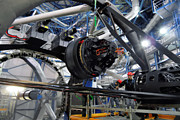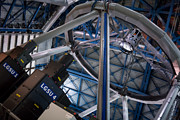Mitteilung
Adaptive Optik am VLT der ESO erhält den Paul F. Forman Team Engineering Excellence Award 2018
18. September 2018
Die wegweisende Arbeit des ESO-Teams für die Adaptive Optics Facility (AOF) wurde von der Optical Society (OSA) geehrt und mit dem Paul F. Forman Team Engineering Excellence Award 2018 ausgezeichnet. Das Team bekam den OSA-Preis während der Frontiers in Optics (FiO) + Laser Science (LS)-Preisverleihungszeremonie am 17. September in Washington D.C., USA.
Das Team erhielt die Auszeichnung für die Ausstattung von Yepun, dem Hauptteleskop 4 des Very Large Telescope der ESO mit 8,2 Metern Durchmesser, mit adaptiver Optik. Die AOF war ein bedeutendes Projekt, mit dem die Sicht der beiden Instrumente Multi Unit Spectroscopic Explorer (MUSE) und High Acuity Wide-field K-band Imager (HAWK-I) verbessert werden sollte, indem sie die Fähigkeit erhielten, die Unschärfe-Effekte der Erdatmosphäre zu kompensieren [1].
Die präzise und komplexe Technik hinter der AOF wurde nun mit dem Paul F. Forman Team Engineering Excellence Award ausgezeichnet, den Elise Vernet, Johann Kolb und Robin Arsenault für das AOF-Team entgegen nahmen. Der Preis wird jährlich vergeben, um die besten technischen Errungenschaften oder gesellschaftlichen Beiträge auf dem Gebiet der optischen Technik zu ehren, und war auch schon Ingenieurteams verliehen worden, die an bahnbrechenden Projekten wie dem Advanced LIGO-Experiment arbeiteten, welches für die berühmte Entdeckung der Gravitationswellen von kollidierenden Schwarzen Löchern und Neutronensternen genutzt wurde.
Zuletzt war die Technik hinter den ESO-Teleskopen mit diesem renommierten Preis ausgezeichnet worden: 2017 erhielt die Guide Star Alliance den Preis für die Produktion leistungsstarker Leitstern-Laser (SodiumStar). SodiumStar war das Ergebnis einer Industriepartnerschaft zwischen dem AOF-Team der ESO, TOPTICA Photonics und MPB Communications (MPBC) und wurde als eine Kerntechnologie der nächsten Generationen bodenbasierter Teleskope geehrt [2].
Mit diesem Musterbeispiel wegweisender Ingenieurskunst hat das AOF-Team Astronomen in den ESO-Mitgliedsstaaten mit einem unschätzbaren Werkzeug zur Erforschung des Universums ausgestattet. Außerdem wird sich die Erfahrung, die die ESO-Ingenieure sammelten, als entscheidend erweisen, um zukünftige technische Herausforderungen zu meistern, wie etwa den Bau des Extremely Large Telescope – des größten Auges der Welt auf den Himmel.
Endnoten
[1] Die AOF setzt sich aus mehreren Teilen zusammen, darunter auch die Four Laser Guide Star Facility und der sehr dünne, verformbare Sekundärspiegel von Hauptteleskop 4. Das 4LGSF leuchtet mit vier 22-Watt-Laser-Strahlen in den Himmel, um Natriumatome in der oberen Atmosphäre zum Glühen zu bringen und auf diese Weise Lichtpunkte am Himmel zu produzieren, die Sterne nachahmen. Sensoren in den Adaptive-Optik-Modulen GRAAL und GALACSI nutzen diese künstlichen Leitsterne, um die atmosphärischen Bedingungen zu bestimmen und die Korrekturen, die nötig sind, um die Bildqualität zu verbessern. Tausendmal pro Sekunde passt sich das AOF-System an die Atmosphären-Bedingungen an, indem die Form des verformbaren Sekundärspiegels des Teleskops verändert wird, um die atmosphärischen Störungen auszugleichen. Dies erfordert die Koordination vieler verschiedener Untersysteme und ermöglicht es dem AOF, MUSE und HAWK-I mit einer so exquisit sensiblen Sicht auszustatten.
[2] Andere Industriepartnerschaften waren ebenfalls förderlich für den Erfolg der AOF. Microgate und ADS lieferten den verformbaren Sekundärspiegel, dessen zentraler Bestandteil der 1,1 Meter große, sehr dünne Spiegel ist, hergestellt von SAGEM-REOSC. NTE Sener lieferte das opto-mechanische GRAAL-System, und TNO stellte Launch-Teleskope für die Four Laser Guide Star Facility her. NOVA leistete bedeutende Beiträge zur ASSIST-Bank, mit der sich die AOF in Europa qualifizierte, und das MUSE-Konsortium stellte nicht nur ein hochmodernes Instrument zur Verfügung, sondern half auch dabei, die Leistung der AOF auszubilden.
Links
- Die Adaptive Optics Facility
- Hochmodernes System Adaptiver Optik sieht erstes Licht
- Mitglieder des AOF-Teams
Kontaktinformationen
Robin Arsenault
AOF Project Manager
Garching bei München
Tel: +49 89 3200 6524
E-Mail: rarsenau@eso.org
Calum Turner
ESO Public Information Officer
Garching bei München
Tel: +49 89 3200 6670
E-Mail: pio@eso.org
Über die Mitteilung
| ID: | ann18066 |
Our use of Cookies
We use cookies that are essential for accessing our websites and using our services. We also use cookies to analyse, measure and improve our websites’ performance, to enable content sharing via social media and to display media content hosted on third-party platforms.
ESO Cookies Policy
The European Organisation for Astronomical Research in the Southern Hemisphere (ESO) is the pre-eminent intergovernmental science and technology organisation in astronomy. It carries out an ambitious programme focused on the design, construction and operation of powerful ground-based observing facilities for astronomy.
This Cookies Policy is intended to provide clarity by outlining the cookies used on the ESO public websites, their functions, the options you have for controlling them, and the ways you can contact us for additional details.
What are cookies?
Cookies are small pieces of data stored on your device by websites you visit. They serve various purposes, such as remembering login credentials and preferences and enhance your browsing experience.
Categories of cookies we use
Essential cookies (always active): These cookies are strictly necessary for the proper functioning of our website. Without these cookies, the website cannot operate correctly, and certain services, such as logging in or accessing secure areas, may not be available; because they are essential for the website’s operation, they cannot be disabled.
Functional Cookies: These cookies enhance your browsing experience by enabling additional features and personalization, such as remembering your preferences and settings. While not strictly necessary for the website to function, they improve usability and convenience; these cookies are only placed if you provide your consent.
Analytics cookies: These cookies collect information about how visitors interact with our website, such as which pages are visited most often and how users navigate the site. This data helps us improve website performance, optimize content, and enhance the user experience; these cookies are only placed if you provide your consent. We use the following analytics cookies.
Matomo Cookies:
This website uses Matomo (formerly Piwik), an open source software which enables the statistical analysis of website visits. Matomo uses cookies (text files) which are saved on your computer and which allow us to analyze how you use our website. The website user information generated by the cookies will only be saved on the servers of our IT Department. We use this information to analyze www.eso.org visits and to prepare reports on website activities. These data will not be disclosed to third parties.
On behalf of ESO, Matomo will use this information for the purpose of evaluating your use of the website, compiling reports on website activity and providing other services relating to website activity and internet usage.
Matomo cookies settings:
Additional Third-party cookies on ESO websites: some of our pages display content from external providers, e.g. YouTube.
Such third-party services are outside of ESO control and may, at any time, change their terms of service, use of cookies, etc.
YouTube: Some videos on the ESO website are embedded from ESO’s official YouTube channel. We have enabled YouTube’s privacy-enhanced mode, meaning that no cookies are set unless the user actively clicks on the video to play it. Additionally, in this mode, YouTube does not store any personally identifiable cookie data for embedded video playbacks. For more details, please refer to YouTube’s embedding videos information page.
Cookies can also be classified based on the following elements.
Regarding the domain, there are:
- First-party cookies, set by the website you are currently visiting. They are stored by the same domain that you are browsing and are used to enhance your experience on that site;
- Third-party cookies, set by a domain other than the one you are currently visiting.
As for their duration, cookies can be:
- Browser-session cookies, which are deleted when the user closes the browser;
- Stored cookies, which stay on the user's device for a predetermined period of time.
How to manage cookies
Cookie settings: You can modify your cookie choices for the ESO webpages at any time by clicking on the link Cookie settings at the bottom of any page.
In your browser: If you wish to delete cookies or instruct your browser to delete or block cookies by default, please visit the help pages of your browser:
Please be aware that if you delete or decline cookies, certain functionalities of our website may be not be available and your browsing experience may be affected.
You can set most browsers to prevent any cookies being placed on your device, but you may then have to manually adjust some preferences every time you visit a site/page. And some services and functionalities may not work properly at all (e.g. profile logging-in, shop check out).
Updates to the ESO Cookies Policy
The ESO Cookies Policy may be subject to future updates, which will be made available on this page.
Additional information
For any queries related to cookies, please contact: pdprATesoDOTorg.
As ESO public webpages are managed by our Department of Communication, your questions will be dealt with the support of the said Department.



